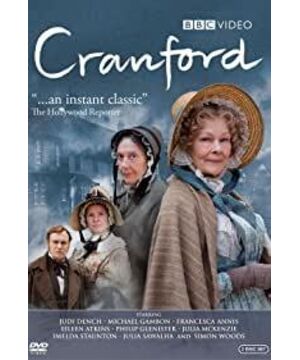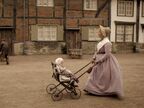On the evening of September 21, 2008, the 60th Emmy Awards ceremony was grandly held at the Nokia Theater in Los Angeles. The mini-series "Cranford" adapted from the BBC's classic classics introduced by PBS in the United States appeared on the list of award nominations announced on July 17. It was a surprise, which brought the Emmy Awards, which dominated American dramas. An elegant and warm classic British style. Although it was unexpected, in the end "Cranford" lost to the City of Angels, but it still makes people feel regretful. Unexpectedly because the Emmys are an American game after all, and it's a pity it's really a really good TV miniseries. Whether it is the production team, the details, the ideological content or the narrative method, "Cranford" is a milestone in the history of the adaptation of BBC classics into mini-series.
In the UK, the play is known as the "Battle of the Lady". What impression does the name "Battle of the Ladies" give you? For Chinese audiences who have watched a lot of Taiwanese, Korean, and Japanese dramas, it can't help but remind people of TV dramas such as "Golden Branches Desire", "Women's World" and "Daao", which show the struggle of women in the palace. If you're looking forward to seeing palace conspiracies and jealousy between women, "Cranford" is by no means a good TV show, because it has nothing to do with the court at all. The Ladies do not live in the palace, but in a small town called Cranford. And this battle is not another battle: this battle is a battle of acting skills, not a power struggle in the court.
production team
"Cranford" has a strong production team and a luxurious cast, many of which have been canonized by the Queen of England for their achievements in theatrical arts, and each has the title of Lord. The small town of Cranford naturally became the stage for these old artists to play. Audiences who like British movies and TV series, especially BBC TV series, will find many familiar faces in this TV series. Oscar winner Judi Dench, who played James Bond's boss in the "007" series and Queen Elizabeth I in "Shakespeare in Love", plays the weak and extremely kind heroine Mathiere in this play De Jenkins, who was nominated for Best Actress in a Miniseries at the Emmy for this role; Yimei, a two-time Lawrence Olivier Award-winning actress who starred in "Harry Potter and the Order of the Phoenix" Elda Stanton plays the flamboyant, confident and bold Miss Ball; British film and TV star Erin Atkins plays Cranford authority Debow La Jenkins, nominated for this year's Emmy for Best Supporting Actress; Michael Gambon, who played the venerable Dumbledore in the Harry Potter series, as the tragic Mr. Helbrooke; The 1995 BBC version of Pride and Prejudice, loved by audiences around the world, played Julia Savalha, who played the stupid and ignorant silly sister Lydia Bennett, who played twice because of the care of her sick mother and sister. Jesse Brown of Missing Marriage.
In addition, "Cranford" also networked old British actors such as Francesco Anise, Julia McKenzie, Deborah Findlay, Barbara Flynn, and the younger generation in the play. The cast should not be underestimated, all of them have well-known names in the entertainment industry, such as Simon Woods, Ruth Byrne, Claude Brackley and so on. Claude Blakely is a well-known actress in the UK and even in the world. She played the role of Charlotte Lucas in the 2005 film version of Pride and Prejudice. There is also a good performance in the movie "Gosford Manor", but in this play, she can only play the maid of the Jenkins family, Martha. What happened to this group of actors?) In 2001, "Gosford Manor" was full of stars, and there was such a saying: "In the UK, stars either go to Hogwarts School of Witchcraft and Wizardry or go to Gosford. Manor hunting activities." And "Cranford" has gathered Hogwarts wizards and Gosford Manor hunters at the same time, and also added BBC veterans and teenagers, saying that it For the "Battle of the Lady" is really just right.
Script and Times
"Cranford" is changed from three novels by Mrs. Gaskell, a famous British female writer. One of them is "Cranford", the other two are "Mrs. Ludlow" and "Confessions of Dr. Harrison". The BBC has adapted two of Mrs. Gaskell's works before, one is "Wife and Daughter" and the other is "North and South", which has always been a classic in the BBC's adaptation of classic classics. For Mrs Gaskell's works, Chinese readers (not audiences) are probably most familiar with "Mary Berton". However, the BBC has never remade this work. On the contrary, these novels that are not valued by the Chinese literary circle are favored by the BBC, and all of them are excellent. "Wife and Daughter" (also translated as "Splendid Beauty") can be described as meticulous in costumes and hairstyles, striving for perfection, unique music, and infinite scenery; "North and South" has a special narrative, deep love, rich characters, and touching story. But Mrs. Gaskell's work shows us the unique British idyllic scenery of the Victorian period, which is peaceful and peaceful, humorous, happy but not obscene, sad but not hurt, plain as water but sweet, ordinary people but heart-warming.
In England, the mid-nineteenth century was a time of change, industrialization accelerated, England was changing all the time, but Cranford remained the same and different. It is a town in Cheshire, 20 miles from Manchester, inhabited by descendants of the aristocracy and middle class. To the people who live here, Cranford is their whole world. They turned a deaf ear to the changes that took place in England, and even adopted an attitude of resistance, trying to maintain their own living habits and traditions, fearing that the outside world would invade the community and destroy the noble traditions and living tastes they had maintained for so long. However, the aristocracy and the middle class had already begun to decline before the era of big industry. Because they disdain doing business and do not want to put down the air to learn some skills to support their families, they can only live on the savings of their ancestors. Naturally, they are very poor in this era, but they are ashamed to talk about wealth, thinking that it is the most vulgar topic in the world. This leads to a lot of things that seem ridiculous to modern people, such as being a guest at someone's house for more than a quarter of an hour, not being immersed in the joy of talking and forgetting the time, but at the same time not looking at the clock, because then Very impolite. When there are no guests at night, the two candles should be replaced to keep the length of the two candles equal, giving people the feeling that two candles are being lit all the time, and at the same time comforting themselves, euphemistically called "noble frugality", and when When I heard footsteps outside, I immediately lit both candles to show that I could still afford two candles. You can't suck an orange, because it's too inelegant to eat it. You can't jump on the bed with your feet because it's vulgar. I couldn't bear to slaughter the cow that fell into the lime pit and burnt its entire body, let alone freeze to death, so I put a flannel coat on it. There is also a collection of lace lace, a family heirloom, which is said to be made by French nuns in the last century. It is usually reluctant to wear it. In order to maintain its luster, it is washed with milk. Unfortunately, the cat recognizes this ribbon as a delicacy. After eating it, I had to pour in the spit stone. After the cat's pain, the ribbon finally reappeared... These trivial things in life seem pedantic and ridiculous, but they reflect the most simple family and friendship between people. It is also the sincere emotion that is most lacking in the industrial age.
No matter how much people resist change, change is creeping into Cranford. Old doctors were no longer up to their jobs, and new young doctors brought revolutionary new treatments from London, causing uproar in Cranford. The railway is going through Cranford, the spiritual pillar of the Cranford tradition - the ultra-conservative but extremely kind Deborah Jenkins has also died, and Cranford is quietly changing, although the surface is calm. . Deborah's sister Mathilde is a lovely character who is deeply influenced by her sister, has no opinion but is very kind. When she was young, she rejected Mr. Helbrook's marriage proposal because she couldn't bear to hurt her family. After 30 years, they meet again. , but the feelings remain the same. Deborah's absence gave Mathilde new courage, but without luck, Mr. Helbrooke fell ill and died. This makes the maid Martha a blessing in disguise, and gets permission to associate with her beloved carpenter. Overjoyed, Martha runs to meet her lover, while the carpenter is on his way to deliver the coffin of the dead Mr. Helbrooke. The love of the older generation has failed, but the love of the new generation has gained a bumper harvest. In addition, Jesse Brown and Mathilde had a very similar experience. She missed her marriage twice because she had to take care of her sick family. When she thought she was going to be an old maid like Mathilde, things took a turn: How can the return of a lover from India be not a surprise? But the surprise that the audience could not expect is still to come, that is, the return of Mathilde's long-lost brother Peter. This rebellious priest's son was out of tune with Cranford's original conservative atmosphere since he was a child. He did not belong to Cranford, so he left his hometown very early. And the changing Cranford embraced him again. Doesn't his return also prove a change in Cranford? Similar to Mathilde was Sophie Hatton, also the daughter of the Dean, but the outcome was so different that Mathilde rejected Mr. Helbrook's marriage proposal when she was young, despite the reunion three decades later. Courage was lost to time that never came back, and Sophie's love with a young doctor who broke into the gated Cranford community was twists and turns due to family and misunderstandings, but finally got on the drive out of church. carriage. Peter, who traveled far away to catch up with the fashion at the time, joined the army and went to India, where he only wrote a letter once, promising to give his lovely sister Mathilde a piece of Indian muslin as her wedding dress, but this plain weave The muslin was never delivered, and Peter was never heard from again. Thirty years later, Mathilde is still alone. Peter returns to Cranford with the promise of the year. Although Muslin is thirty years late, what does it matter? After all, Peter is home, and This A belated piece of muslin also fulfilled its due mission, catching up with the wedding of Sophie, the daughter of the successor rectory. How can it be said that Sophie is not Mathilde's life continuation, isn't the belated muslin from India the link between the two? The inhabitants of Cranford could not resist the impermanence of fate and the relentless pace of the times, but they were always accompanied by inner peace and truth, and never lacked moderation and introspection, and the ability to feel life and its true meaning.
Cranford is a place of calm and joy. People need to find the true meaning of life in peace, and they need to observe and experience the seemingly plain but deeply mysterious life with a peaceful heart. "Cranford" is like this. It always touches the softest part of the audience's heart. In just five hours, the audience can experience the poverty and wealth, the secular and the refined, the rumor and the truth, the traditional and the modern. , the conflict between the hustle and bustle and the calm, and the countless emotions such as anger, disappointment, surprise, fear, happiness, etc. to be experienced in life, as well as the reciprocation of life, old age, illness, and death, this reciprocation is not simply standing still, Rather, it is an upward spiral.
The narrative style of the original book is very special. The author narrates what he saw and heard in Cranford in the first person, so it is also translated into "Cranford Chronicles" in China. But the author does not record insignificant things like a running account, but revolves around a theme - change. It is very appropriate to describe the narrative of the novel with a metaphor made by the author himself in the book: it is like a long thread tied by multiple threads, colorful, but it is a thread. Such a special narrative method is a double-edged sword for the adaptor. The good side is that it is easy to incorporate other stories into "Cranford", which is why the stories of Mrs. Ludlow and Dr. Harrison are included. After that, "Cranford" still doesn't feel awkward and abrupt. The downside is that such unique perspectives are hard to convey through television. The character of the narrator, Mary Smith, hardly achieves the status it has in the books in the medium of television, and it feels redundant.
The BBC's official website has reported that the second season of "Cranford" will be launched on BBC One on the occasion of Christmas 2009. Yes, the story of Cranford is not over yet. What kind of surprise and emotional impact will this group of "Ladies" with perfect acting skills bring us? Let's wait and see.
View more about Cranford reviews











